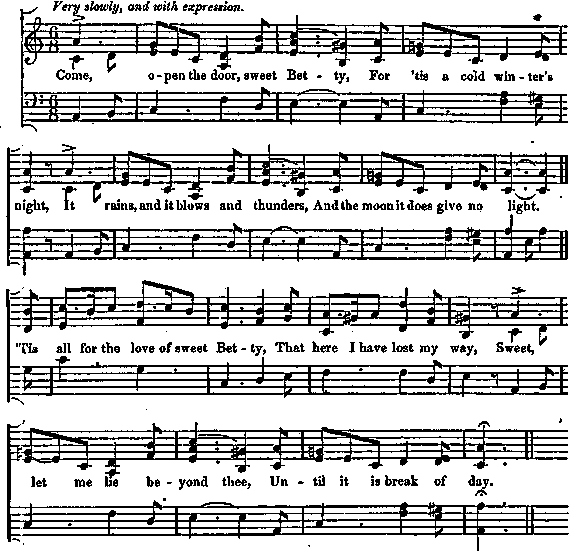Popular Music Of The Olden Time Vol 2
Ancient Songs, Ballads, & Dance Tunes, Sheet Music & Lyrics - online book
| Share page | Visit Us On FB |
|
REIGN OF CHARLES It 505 |
|||
|
The Scotch tune, " Blink over the burn, sweet Betty,"* bears no resemblance to " Come, open the door, sweet Betty,"—nor do the Scotch words, in any early collection, resemble the English; but the song quoted by Burns, and since adopted in Wood's Songs of Scotland, is evidently taken from the following ballad. |
|||
|
|
|||
 |
|||
|
" Come, open the door, sweet Betty," re-appears in the first part of a tune called Tom Nokes' Jigg. The time is changed; it is quick, and in g measure,—but evidently from the same root. It is to be found in the first edition of Apollo's Banquet, 1669. Tom Nokes (from whom it derives its name) was a favourite actor in the reign of Charles the Second. The following notice of Nokes and Nell Gwyn is from the appendix to Downes' Roscius Anglicanus, edition of 1789:— |
|||
|
|
|||
|
6 It has been staled that the first line of *' Slink o'er thi burn" is quoted by Shakespeare in King Lear, actiii., ic. 6 :—
" "Wantest thou eyes at trial, Madam? Come o'er the bourn, Bessy, to me ;** but the allusion is to an English ballad by William Birch, en'itled "A Songe betwene the Quenea Majestie and Er glande," a copy of which is in the library of the Society of Antiquaries. England commences the dialogue, inviting Queen Elizabeth in the following words:— |
41 Come over the born, Bessy, come over the born, BeBsy,
Swete Bessy, come over to me." Another, "Come o'er the burne, Bessie," will be found in Addit. MSS. Brit Mus. No. 5665, with music. I may here remark, that the tune to Take thy oldjcloak about thee (one of the ballads quoted by Shakespeare) is evidently formed out of Green Sleeves. The earliest known copy of the words is in English idiom, in Bishop Eercy's folio manuscript, and I have little doubt that both words and music are of English origin. |
||